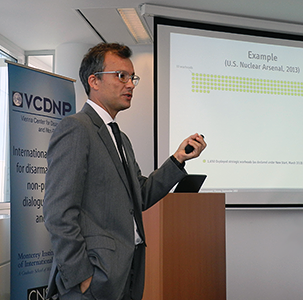
On 23-27 September 2013, the Vienna Center for Disarmament and Non-Proliferation (VCDNP) and the James Martin Center for Nonproliferation Studies (CNS) conducted the sixth intensive course on Nuclear Non-proliferation and Disarmament. The one-week program covers essential elements of the non-proliferation regime, the Treaty on the Non-Proliferation of Nuclear Weapons (NPT) and its associated institutions and mechanisms, current non-proliferation, arms control, and disarmament challenges as well as possible policy remedies.

These courses are oriented toward young or mid-career diplomats and other practitioners primarily from developing states. Twenty-three participants, selected on a competitive basis, represented states from the Middle East, Africa, South America, Asia, and other regions with about half of them coming from national capitals and the rest representing their state’s missions in Vienna. Twelve out of twenty-three participants were women.
The course program featured a number of well-known senior experts from a range of intergovernmental institutions, nongovernmental organizations, and Member States, including: Dr. William C. Potter (CNS), Tariq Rauf (Global Nuclear Solutions), Leonard S. Spector (CNS), Laura Rockwood (International Atomic Energy Agency, IAEA), Jill Cooley (IAEA), Robert Kelley (IAEA Safeguards (ret.)), Nikita Perfilyev (Comprehensive Nuclear Test-Ban-Treaty Organization), Gaukhar Mukhatzhanova (CNS), Elena Sokova (VCDNP), Daniel Feakes (Organisation for the Prohibition of Chemical Weapons), Amb. Tim Caughley (UN Institute for Disarmament Research), Alexander Glaser (Princeton University), and Dr. Nikolai Sokov (VCDNP).
As in previous years, the September 2013 course consisted of two parts: the online module and the in-class module, held in Vienna at VCDNP. The online module was intended to bring participants up-to-date on key concepts and facts, as well as elements of the nuclear non-proliferation regime, and to create a common knowledge base among participants in preparation for expert lectures.

The in-class module provided in-depth coverage and analysis of the background, the key elements, organizations, and issues related to the nuclear non-proliferation regime. Lectures addressed both the history of relevant issue-areas and their current status. The topics included the following main themes:
All VCDNP Non-Proliferation and Disarmament Courses include a field trip. The September 2013 trip took participants to the IAEA safeguards laboratories and the satellite imagery facility.
On the first day, course participants attended a panel discussion titled 2012-2015 Review Cycle of the Treaty on the Non-Proliferation of Nuclear Weapons (NPT): The State of Play, which featured as speakers Dr. William Potter (CNS), Amb. Khaled Shamaa (Egypt), Amb. Alexander Kmentt (Austria), and Amb. Cristian Istrate (Romania). The event provided a factual and analytical overview of the NPT review process, positions of various states and groups of states, as well as the key outstanding issues and challenges.
The course ended with a roundtable discussion, titled Disarmament Machinery and New Initiatives, with Amb. Alfredo Labbé (Chile), Amb. Tim Caughley, Dr. Ronald Sturm (Austria), Ms. Elena Sokova (VCDNP), Ms. Gaukhar Mukhatzhanova (CNS), and Dr. Nikolai Sokov (VCDNP). Speakers focused on the latest efforts to advance the process of bilateral and multilateral nuclear arms control and disarmament. During a lively discussion, participants exchanged views and assessments of the state of affairs and elaborated on the possible ways to overcome obstacles to eliminating nuclear weapons.
The VCDNP extends its gratitude to the Carnegie Corporation of New York, Sloan Foundation, John D. and Catherine T. MacArthur Foundation, Federal Ministry of European and International Affairs of Austria, and the Ministry of Foreign Affairs of Norway for their generous support that made this course possible.

At the end of the course, participants completed an anonymous survey. The following are some of the assessments provided by participants (quoted as written):



By continuing to use the site, you agree to the use of cookies. more information
The cookie settings on this website are set to "allow cookies" to give you the best browsing experience possible. If you continue to use this website without changing your cookie settings or you click "Accept" below then you are consenting to this.